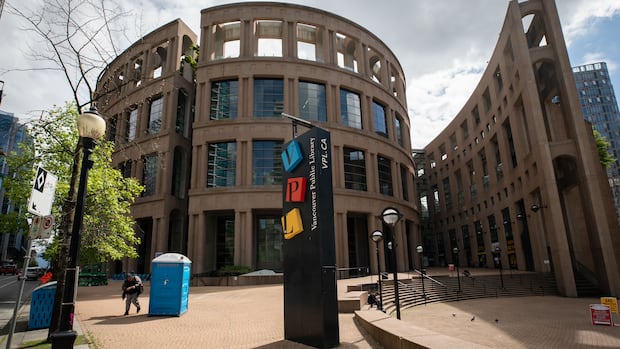British ColumbiaFor the first time in its history, loans of digital materials, such as e-books, e-magazines and music, have exceeded those of physical copies at the library, although online facsimiles cost three to five times as much.Digital materials cost three to five times more than physical copiesChad Pawson · CBC News · Posted: Nov 04, 2025 10:00 AM EST | Last Updated: 5 hours agoListen to this articleEstimated 4 minutesThe Vancouver Public Library main branch in downtown Vancouver is seen from Robson Street. In 2024 the library had 1.8 million items in its physical collection and around 696,000 digital items. (Maggie MacPherson/CBC)For the first time in the Vancouver Public Library’s history, loans of digital materials, like e-books, e-magazines and music, have exceeded those of physical copies at the library, although online facsimiles costing three to five times as much.The milestone is a win for accessibility, but could compound an ongoing problem for libraries, which is being able to pay for enough digital materials to meet demand and have significant collections of them compared to physical versions.“It wasn’t as critical in the early days just because digital content didn’t have the popularity then,” said Kay Cahill, the Vancouver Public Library’s (VPL) director of collections and technology.“But the more it’s increased in popularity and the more … we’re putting our collection budget towards it, it’s become more of an issue.”Kay Cahill, director of I.T and collections is pictured at the Vancouver Public Library in Vancouver, B.C. on Thursday, May 18, 2023. (Ben Nelms/CBC)In 2024 the library had 1.8 million items in its physical collection and around 696,000 digital items.Digital versions of books have been at libraries like the VPL for at least 15 years, but the pandemic accelerated demand for them when residents couldn’t physically get to libraries.According to VPL’s annual reports, that demand has not ebbed, only grown. The latest data shows that digital circulation increased by 16 per cent in 2024 compared to 2023, while physical circulation declined 3.5 per cent for the same period.The digital versions cost more because of licensing agreements with publishers that require libraries to essentially rent the materials.They pay for book access either by a set time limit or by a number of downloads, meaning libraries aren’t able to own the title outright.It’s been an issue across the country for many libraries, with the most public-facing consequence often being long waits for the digital copies of materials, while behind the scenes, it’s managing budgets.According to the Vancouver Public Library Foundation, it costs around $30, for example, for a print copy of Rebecca Yarros’ Onyx Storm, but $85 for a digital version.The charitable foundation, which raises around $2 million per year for the library, is campaigning for specific funds to help offset the demand on the library’s $65 million yearly budget, of which only 8.5 per cent is available for collections.The vast majority of VPL’s costs are for salaries and benefits, then its facilities, followed by its collections.“Libraries pay a lot more for digital materials than individual consumers pay for digital materials, and they pay more for digital materials than they pay for print books,” said Jenny Marsh, executive director of the Vancouver Public Library Foundation.“So as digital collections use grows and the cost is typically … higher, we’re seeing a big gap in VPL’s available budget for collections.”Policy and funding solutionsIn 2019 the Canadian Federation of Library Associations said that urban public libraries were spending up to 30 per cent of their materials budgets on digital content. It’s advocating for new government policies over the issue.”This situation will deteriorate if the Canadian government does not take action by identifying policy solutions that prevent restrictive licensing and pricing practices and encourage fair commercial practice,” it said in a position statement.In the fall the Union of B.C. Municipalities also passed a resolution calling on the province to increase its share of core library funding from $14 million for all 71 library systems in the province to $30 million.More than 90 per cent of library funding comes from local governments, said UBCM.
E-borrowing exceeds print at Vancouver libraries can it keep up with the cost?











